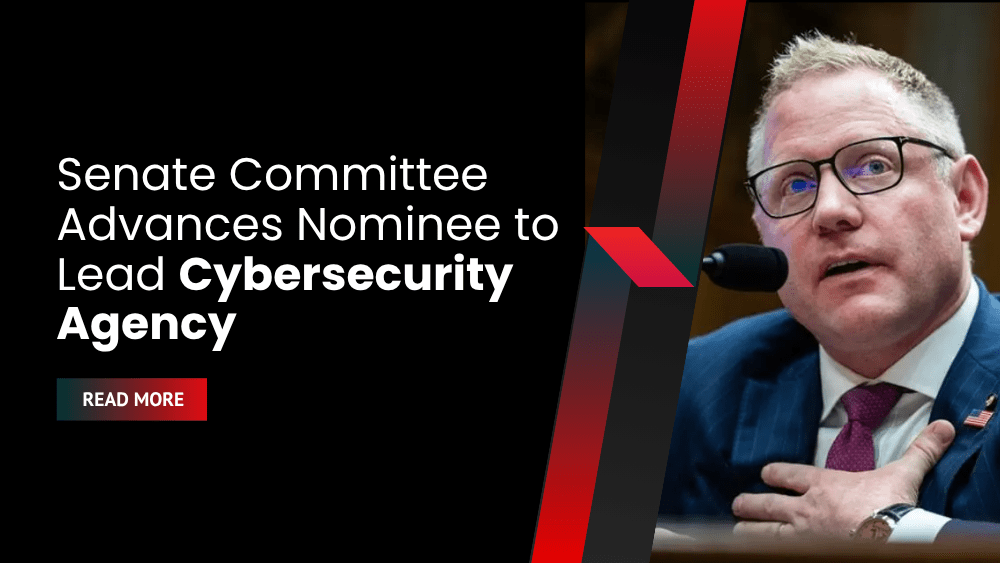Amid heightened scrutiny over election security and foreign cyber threats, the U.S. Senate Homeland Security Committee has advanced the nomination of Sean Plankey to lead the Cybersecurity and Infrastructure Security Agency (CISA). The 9-6 vote on August 4 marks a significant step for Plankey, a retired U.S. Coast Guard officer and former cyber official in Donald Trump’s first administration. However, the path to full Senate confirmation remains uncertain due to bipartisan concerns and a procedural roadblock placed by Senator Ron Wyden.
CISA’s Future Leadership Remains Uncertain as Political Divisions Stall Confirmation
Plankey’s nomination comes during a period of transformation and tension within CISA. After high-profile efforts to counter misinformation during the 2020 election and the COVID-19 pandemic, the agency has simultaneously endured sweeping job cuts and growing partisan division over its mission. The Republican-led reshaping of CISA places new emphasis on traditional cybersecurity while downscaling activities related to disinformation.
Trump-Aligned Nominee with Prior Federal Cyber Credentials
Sean Plankey brings prior experience to the role, having served as Director for Cyber Policy at the National Security Council and as Principal Deputy Assistant Secretary at the Department of Energy. His military background in the U.S. Coast Guard and past service in Trump’s first presidency position him as a known quantity within Republican cybersecurity circles.With Plankey’s nomination, President Trump appears intent on redirecting CISA toward core technical functions, particularly defending critical infrastructure and federal IT systems. During his July confirmation hearing, Plankey underscored a desire to restore CISA’s foundational role, affirming support for:
- Renewing the Cybersecurity Information Sharing Act of 2015
- Increasing funding for the State and Local Cybersecurity Grant Program
- Strengthening industry collaboration on cyber defense
These policy positions align with Republican lawmakers’ demands to pivot CISA away from “perceived political activities” such as countering disinformation.
CISA Under Criticism for Counter-Disinformation Work
CISA’s evolving mission has remained a point of contention since its role in disputing election fraud allegations in 2020—a stance that contributed to former director Chris Krebs’ dismissal by then-President Trump. The agency also took on an active role in debunking COVID-19 misinformation, efforts that some Republican lawmakers characterize as censorship.During his confirmation hearing, Plankey was specifically questioned by Democratic Senator Richard Blumenthal for refusing to explicitly confirm that the 2020 election was not rigged. Blumenthal alleged that Plankey’s ambiguity could further erode public confidence in election integrity. Plankey opted not to revisit previous electoral outcomes, instead reiterating his focus on forward-looking security initiatives. This reluctance to take a clear position on the 2020 election adds to skepticism among Democrats, reinforcing concerns that a Trump-aligned CISA director may be less committed to fighting misinformation that undercuts democratic institutions.
Senator Wyden’s Hold Hinges on Telecom Vulnerabilities Disclosure
A major obstacle blocking full Senate confirmation is Senator Ron Wyden’s procedural hold, tied to transparency concerns surrounding U.S. telecom infrastructure. Wyden, a Democratic member of the Senate Intelligence Committee, insists the administration release an unclassified 2022 report exposing severe cybersecurity flaws in major telecommunications providers.Wyden describes the situation as a “multi-year cover-up,” arguing that CISA and other federal agencies have withheld critical information from the public and Congress. His concerns are compounded by the Chinese cyberespionage group “Salt Typhoon,” which has recently exploited telecom vulnerabilities in attacks targeting U.S. systems.
“The public deserves to know just how weak telecom cybersecurity has been, especially in light of nation-state campaigns like Salt Typhoon,” Wyden stated, according to Cybersecurity Dive.
Unless the report is declassified and released, Wyden has pledged to continue blocking Plankey’s confirmation. He asserts that the Executive Branch has full authority to release the document and that its suppression undermines public trust in national cybersecurity disclosure.
Operational Capacity Issues Compound Leadership Vacuum
Even beyond controversy over the nominee, CISA faces considerable operational challenges. Since February 14, more than 130 positions have been eliminated from the agency, raising serious concerns about its capacity to fulfill its mandate. Staff reductions come at a time when federal, state, and local agencies increasingly depend on CISA for cyber threat intelligence, incident response coordination, and election system protection.Republican lawmakers argue that refocusing CISA on network defense will streamline its mission and optimize resources. Yet critics warn that deprioritizing disinformation countermeasures—particularly during an election year—could leave U.S. voting infrastructure and public discourse vulnerable to manipulation.
CISA Leadership Transition at a Crossroads
The advancement of Sean Plankey’s nomination for CISA leadership reflects the broader recalibration of U.S. cybersecurity priorities under the Trump administration. With mounting concerns over critical infrastructure security, telecom sector transparency, and nation-state threats like Salt Typhoon, the leadership vacuum at CISA presents both opportunity and risk.Key takeaways for cyber policy stakeholders include:
- Confirmation is still uncertain — Senate hold by Senator Wyden remains a barrier.
- Telecom security disclosures could influence CISA’s accountability narrative.
- The agency is in a precarious operational state due to staffing reductions.
- Refocusing on infrastructure defense may come at the expense of disinformation response during a volatile election season.
Unless the standoff over the telecom report is resolved, CISA could remain without permanent leadership during a critical period for U.S. cyber defense. For the public and private sectors alike, how this impasse unfolds will directly impact coordination, funding, and strategic direction at one of the federal government’s most important cybersecurity agencies.









